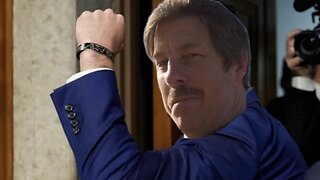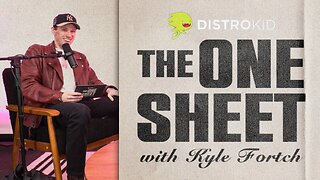Premium Only Content

Lucky Man C'est La Vie Emerson Lake & Palmer
Lucky Man Album: Emerson, Lake & Palmer (1970)
C'est La Vie Album: Works, Volume 1 (1977)
by Emerson Lake & Palmer
Greg Lake started writing "Lucky Man" when he was just 12 years old. "I was round my friend's house and he had a broken down old guitar," Lake explained on his Songs of a Lifetime tour. "In fact, it only had one string on it. Luckily, it was the bottom string. With a matchstick, I picked out this tune.
It made me think, you know, perhaps I could play guitar. So it came to Christmas and I said to my mom, 'Do you think there's any chance of me having a guitar for Christmas?' And she said, 'No.' You know, we were pretty poor. So that was it. I just accepted it.
But anyway, Christmas came, and there it was, the guitar. And of course I was thrilled. The first four chords I learned were D, A minor, E minor, and G. With these chords I wrote this little song. It's a kids' song, really. And it was a medieval fantasy, really. And I never wrote it on a piece of paper. I just remembered the words."
Arguably Emerson, Lake & Palmer's best known song, this almost did not happen. On the last day of recording their first album, ELP did not have enough material to fulfill their contract requirements of 21 minutes per album side. Greg Lake explained: "Everybody looked round the studio, you know, 'Has anybody got any more material?' And there was deadly silence. So I said, 'Well, look, you know, I've got this little thing I wrote when I was a kid. And if there's nothing else, maybe that would do.' You know.
So Keith said, 'Well, you play it, then, let's have a listen.' So I played it, and nobody liked it. So I said, 'Yeah, but you know, the thing is we've got nothing else.' Keith said, 'Well, you record it on your own and I'm going to go down the pub.' So off he went down the pub.
So Carl Palmer and I, we recorded the first part together, just drums and acoustic guitar. And it sounded pretty dreadful. But then I put a bass on it and it sounded a bit better. And then I went and put some more guitars on it, and an electric guitar solo. Then I put these harmonies on, these block harmonies. And in the end it sounded pretty good, it sounded like a record."
The guitar chords on the chorus: A minor, E minor, D, then Dsus - just play a regular D chord and add a G played on the first string, according to Greg.
The end of this song contains one of the most famous Moog synthesizer solos in rock history. Keith Emerson had just recently gotten the device, and only decided to play on this song after hearing the track Lake and Palmer came up with and realizing it was a legitimate song. "Keith came back from the pub and he heard it and was shocked," said Lake. You know, it had gone from this silly little folk song to this quite big production. And so he said, 'Wow, I suppose I'd better play on that.' And so I said, 'The thing is, I've already put the guitar solo on.' He said, 'Look, I could play something at the end.' He said, 'I've just had this gadget delivered next door. It's called a Moog synthesizer. I haven't tried it before, but maybe there's a sound on there that would work on this.' So I said, 'Okay. Why don't we give it a try.'
And so Keith went out into the next room. And he said, 'Run the track, then, for an experiment.' So I flipped it in record and pressed play. And because he was experimenting, we didn't really listen. In fact, we put the speakers on dim. The track went through and Keith experimented, and when it got to the end I turned to the engineer, Eddie Offord. I said, 'Was that me or did that sound good?' And Eddie said, 'I think it did sound good.' And we played it back. And that is the solo that's on the record."
This song does not have a happy ending. The "lucky man" has riches and acclaim, but he decides to fight for his country, gets shot, and dies. Greg Lake says that even though he wrote the song when he was very young, the story was always the same. "The lyrics never changed," he said. "But strangely enough, over time the way that people perceived the song changed. Perhaps it was vaguely something to do with the Vietnam War, that period, just at the end of the Vietnam War. Some people associated it with the John F. Kennedy assassination. It had those sort of overtones. So it was connected in a way to an era when there was a lot of war and drama like that. But the lyrics really got interpreted in a way in which I'd never intended them to be, of course, when I wrote it as a young kid." (Here's our full Greg Lake interview.)
By Emerson, Lake & Palmer standards, this is a very simple song; they got far more complex on their next albums. "Most tracks recorded by ELP, we would say that the backing track would have to be a killer instrumental before we added any voice, so the music had to stand up on its own without the lyrics," Carl Palmer said in his Songfacts interview. "A very simple lyric like 'Lucky Man' is fine - you can take that, too. But the lyrics did mature as time went by, and I think Sinfield and Lake did a great job."
Lake was part of the Mandoki Soulmates, a supergroup assembled by the drummer Leslie Mandoki. Of the many famous songs they played, Leslie says this one was the most challenging to interpret.
Works, Volume 1 was a double album with Keith Emerson the focus of the first side, Greg Lake the second, Carl Palmer the third, and the entire band sharing equally on Side 4. "C'est La Vie" was one of the songs Lake wrote for his side with help from lyricist Pete Sinfield, who was his bandmate in King Crimson. Telling the story of the song, Lake said: "I used to live in Paris for a while. A very beautiful city. I sometimes would go out walking in the streets there, and you'd often hear this instrument playing. I don't know what they call it, really, but it's one of these barrel organ things you wind up. It's the sort of sound, it's a bit like a Las Vegas casino. It kind of lives with you.
Anyway, I'd heard this barrel organ playing. And I walked on back home towards my apartment. I went past this cafe and I heard the voice of Edith Piaf, the famous French lady singer. And when I got back to the apartment I thought, I really would like to write a sort of French song with some French feeling. I don't really speak French, but I knew this phrase, 'c'est la vie,' that's life. And so I thought, That would make a good idea for a song.
So I wrote this song, "C'est la Vie," and we recorded it and put it onto Works Volume I. However, a couple of years later it was covered by a French singer called Johnny Hallyday. And he's a sort of French Elvis Presley. Anyway, he had a #1 hit with it in France, which as an Englishman, of course, gave me a great deal of pleasure."
-
 LIVE
LIVE
Matt Kohrs
9 hours agoMarkets Rocket Higher, Breaking News & Payday Friday || The MK Show
1,818 watching -

BonginoReport
3 hours agoTrump Releases JFK Files: “Everything Will Be Revealed” (Ep.125) - 01/24/2025
24.4K31 -
 LIVE
LIVE
Jeff Ahern
1 hour agoFriday Freak Out with Jeff Ahern (6am Pacific)
703 watching -
 1:34:49
1:34:49
Game On!
13 hours ago $2.32 earnedNFL MVP Finalist announced and Patrick Mahomes got SNUBBED!
12K6 -
 1:22:03
1:22:03
The Criminal Connection Podcast
1 day ago $4.92 earnedEddie 'THE BEAST' Hall: Tanks, Fighting, Films & Not Getting Arrested with the Worlds Strongest Man!
40K5 -
 11:36
11:36
MrBigKid
17 hours ago $8.48 earnedGoing Thermal... AGM Rattler TS25 Thermal Imaging Scope
86.8K6 -
 1:47
1:47
Kyle Fortch
14 hours ago $5.94 earnedTHE ONE SHEET: Season 1 Trailer
57.7K1 -
 15:12
15:12
Clownfish TV
19 hours agoVideo Games WILL Drop DEI, Too. Just Wait.
23.6K9 -
 15:17
15:17
Melonie Mac
21 hours agoFemale "Pastor" Lectures Trump with Abomination Sermon
23.5K59 -
 11:56
11:56
IsaacButterfield
1 day ago $2.59 earnedYou're Racist If You Don't Marry Your Cousin
36.1K9